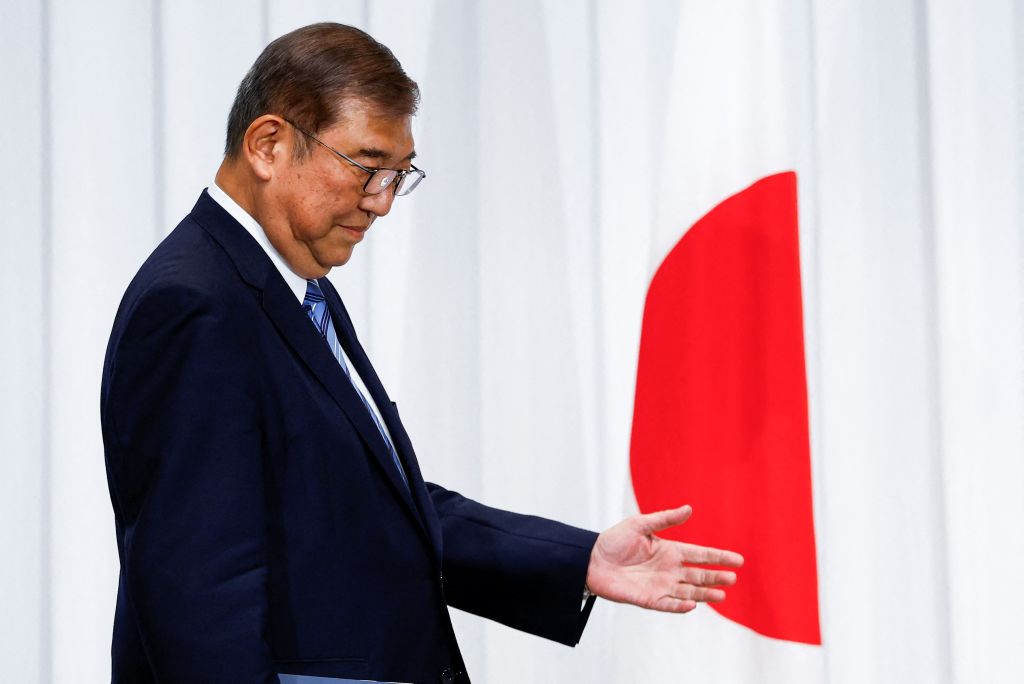Yesterday’s general election in Japan was unusually dramatic and, potentially at least, one of its most consequential. The Liberal Democratic Party, led by box-fresh Prime Minister Shigeru Ishiba (he has been in office for precisely 27 days), has lost its majority even with its customary sidekicks Komeito added on.
This leaves Japan’s eternal party of Government, which has been in power for all but four of the last 69 years, scrambling around for some coalition. Commentators in Tokyo suspect they will probably manage to cobble something together, but the party will be severely weakened. It is possible, after such a historic drubbing, that Ishiba will need to resign.
The LDP are projected to remain the largest party, but only just. The big winner on the night was the Constitutional Democrats, which increased its seat numbers from 98 to 148. There are a few other small parties who made gains and might have a part to play in a putative coalition, though at the moment no one is expressing any enthusiasm for working with Ishiba’s demoralised and tainted LDP.
Why did this happen and what lessons are there for the West? It would be very unfair to blame the result on Ishiba who is a respected figure in the country and the election result, which he has called simply “tough”. He did drop the ball on the issue of reinstating disgraced lawmakers. He said he wouldn’t although evidence emerged suggesting he might. But that was his only gaffe and he campaigned hard.
No, the hugely disappointing result for the LDP is being blamed on two factors: the faltering Japanese economy — inflation and a weakening yen — and a long series of scandals. Inflation is nightmarish in a country where prices and wages remain static for decades and companies have been known to issue grovelling apologies when even tiny price hikes have had to be announced. Japanese inflation has been running at a traumatising 2-3% in the last few years after 40 years of being close to zero, or even below.
As for the scandals, it was probably quantity rather than quality that did for Ishiba’s party — and here Keir Starmer’s Labour government might want to take note. The most recent and salient was a slush fund scandal related to fundraising parties. It lacked the juiciness or personal details of the recent revelations around Labour donor Lord Alli in the UK but left the same sour taste with the voters.
The problem seems to be that this is just one case of petty misbehaviour and graft too many for the Japanese people. The slush fund row came on top of the intense anger provoked by former prime minister Fumio Kishida’s arguably unconstitutional decision to give Shinzo Abe a state funeral (imagine a state funeral for Tony Blair) after he was assassinated. This came on top of the Unification church brouhaha which followed a quaint-sounding but squalid Cherry Blossom party affair involving more dodgy payments along with numerous nepotistic mini scandals. The Japanese electorate are sick of it all.
The other message, which may be of more interest to Kemi Badenoch or Robert Jenrick’s Conservative Party, is that a change of leader doesn’t make much difference if the brand is tainted. Ishiba’s single word description of the results as “tough”, as in “tough luck”, is apt as he isn’t really to blame for the LDP’s rotten reputation. A non-mainstream figure for much of his career, he even resigned from the party once on principle, making him a very rare and distinguished beast in the Japanese political world. He was presumably brought in from the cold to give a veneer of respectability to a party that desperately needed to win back the public’s trust. It clearly wasn’t enough.
Someone else who may be looking at Japan with interest is Reform UK leader Nigel Farage. The Constitutional Democrats were only formed only eight years ago, and have benefitted hugely simply by not being the LDP. Their leader Yoshihiko Noda, a former prime minister with the now defunct Democratic Party of Japan (DPJ), has vowed, Farage-like, that he will spurn any advances to work with the LDP and seeks to essentially obliterate and replace it. “We are truly on the eve of a change of government,” he said.
We will probably find out in the next six months, possibly during the upper house elections next summer, whether Sunday’s poll will be a blip with normal service resuming in due course, or whether it represents a fundamental realignment. The LDP’s potential coalition partners may just be playing hardball in pursuit of the best possible deal. The LDP may reform and recover. For those hoping for true change it may be another false dawn in the land of the rising sun.
Or maybe not. Perhaps this really is existential for the LDP. In which case, the election may have truly international significance. The Japanese political scene, as with the Japanese economy and other aspects of the society, is often depicted as ossified. But if things can change fundamentally here of all places, it will give hope to many in the West, and strike fear into the hearts of certain others.











Join the discussion
Join like minded readers that support our journalism by becoming a paid subscriber
To join the discussion in the comments, become a paid subscriber.
Join like minded readers that support our journalism, read unlimited articles and enjoy other subscriber-only benefits.
Subscribe